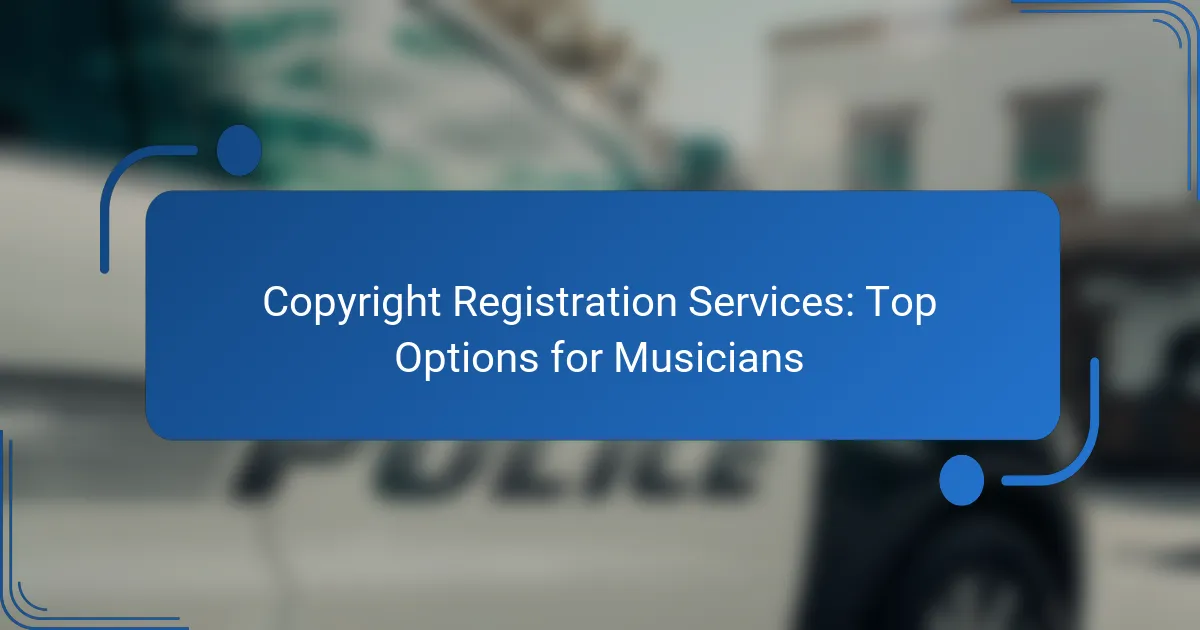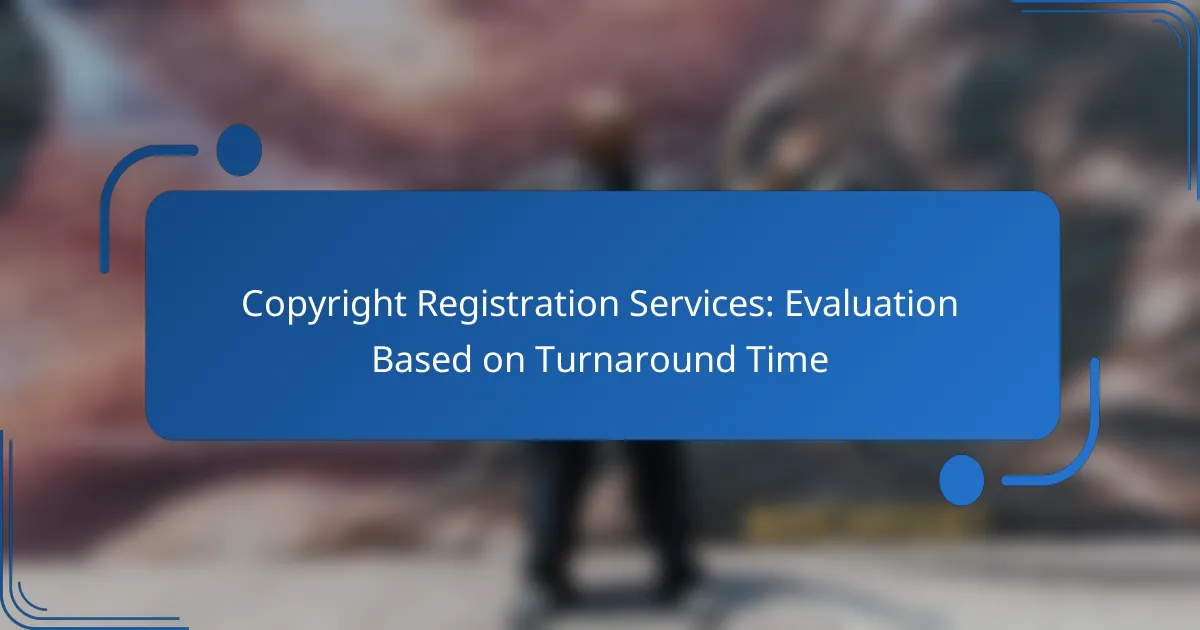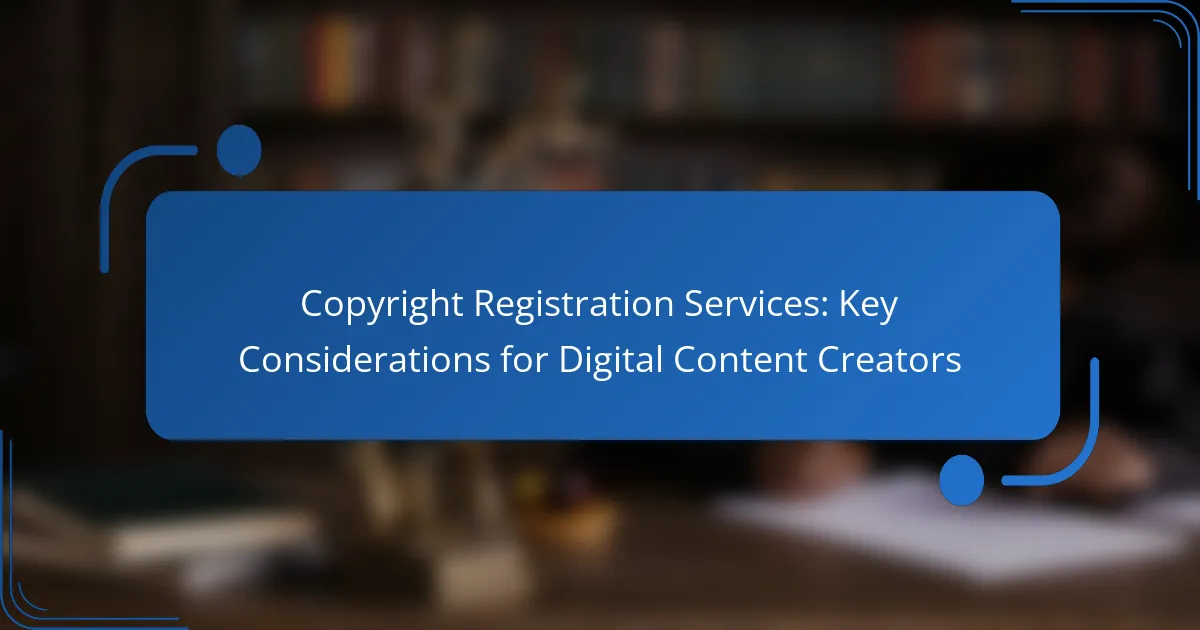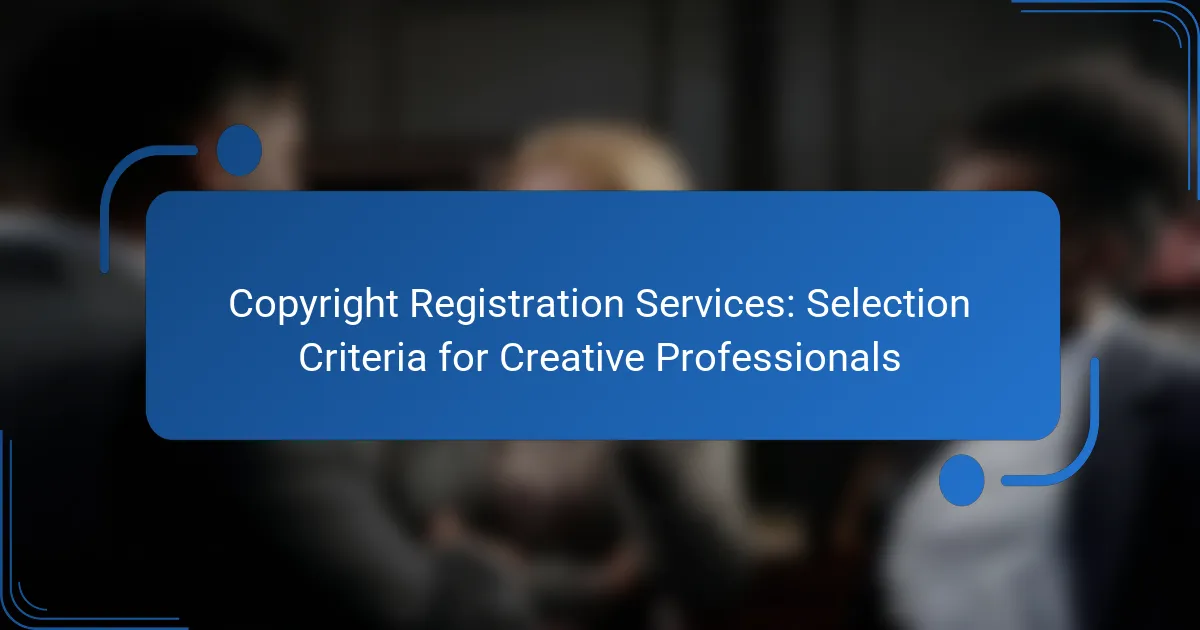For musicians, copyright registration services are vital for protecting their creative works and ensuring they receive the recognition and compensation they deserve. These services, offered by various industry organizations and online platforms, simplify the registration process and help manage rights effectively, allowing artists to secure their original music and enhance their revenue potential.
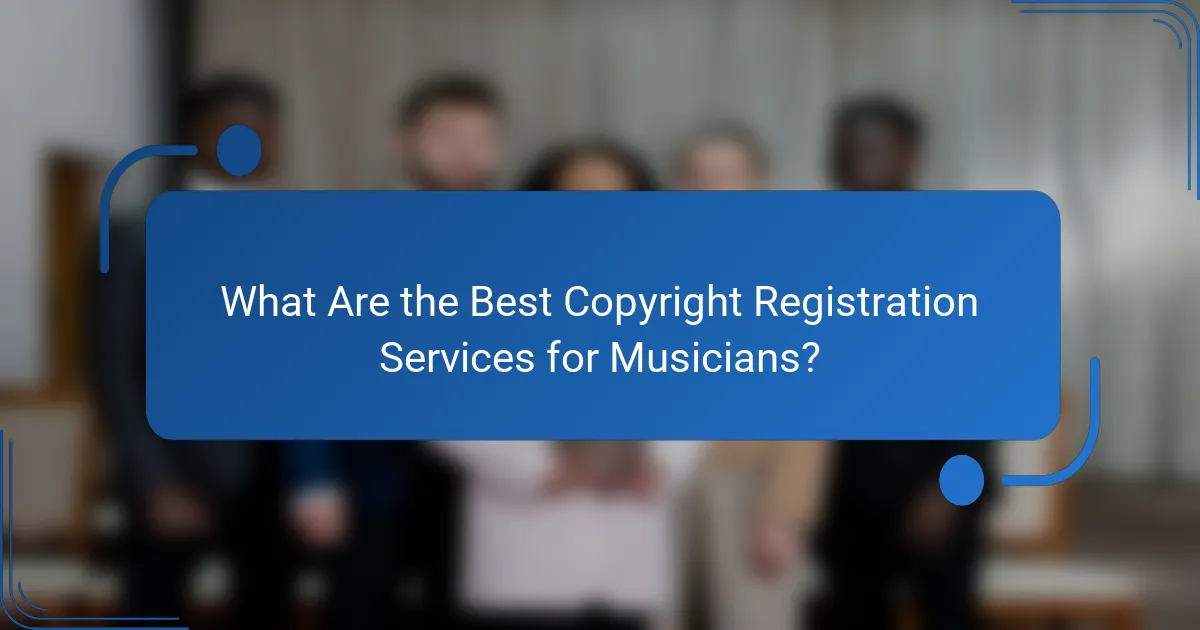
What Are the Best Copyright Registration Services for Musicians?
The best copyright registration services for musicians provide essential protection for their creative works, ensuring they receive proper recognition and compensation. Key options include industry organizations and online platforms that facilitate the registration process and help manage rights effectively.
ASCAP
ASCAP (American Society of Composers, Authors, and Publishers) is a performance rights organization that helps musicians protect their compositions. By joining ASCAP, artists can register their works and receive royalties when their music is played publicly, such as on radio, TV, or live venues.
Membership involves a one-time fee, and ASCAP offers various resources, including workshops and networking opportunities. Musicians should consider ASCAP if they perform frequently or have music played in public settings.
SESAC
SESAC (Society of European Stage Authors and Composers) is another performance rights organization that focuses on providing personalized service to its members. Unlike ASCAP, SESAC operates on an invitation-only basis, which can lead to a more tailored experience for songwriters and composers.
SESAC collects performance royalties and offers various tools to help musicians track their earnings. Artists should evaluate SESAC if they seek a more exclusive organization that may provide enhanced support and resources.
SoundExchange
SoundExchange specializes in collecting and distributing digital performance royalties for sound recordings. This organization is crucial for musicians whose works are streamed on platforms like Spotify or Pandora, as it ensures they receive compensation for digital plays.
Musicians can register for free, and SoundExchange handles the royalty collection process, making it easier for artists to focus on their music. It’s essential for musicians to register with SoundExchange to maximize their earnings from digital platforms.
Copyright.gov
Copyright.gov is the official website of the U.S. Copyright Office, where musicians can register their works directly. This service provides legal protection for compositions and sound recordings, which is vital for enforcing rights against infringement.
The registration process involves submitting an application and a fee, which varies depending on the type of work. Musicians should consider registering their works with Copyright.gov to establish a public record of their ownership and strengthen their legal standing in case of disputes.
Songtrust
Songtrust is a global music publishing administration service that helps musicians manage their rights and royalties efficiently. By registering with Songtrust, artists can ensure their works are registered with multiple performance rights organizations worldwide, maximizing their revenue potential.
Songtrust charges a one-time setup fee and takes a percentage of the royalties collected. This service is ideal for independent musicians looking to streamline their rights management without navigating multiple organizations individually.
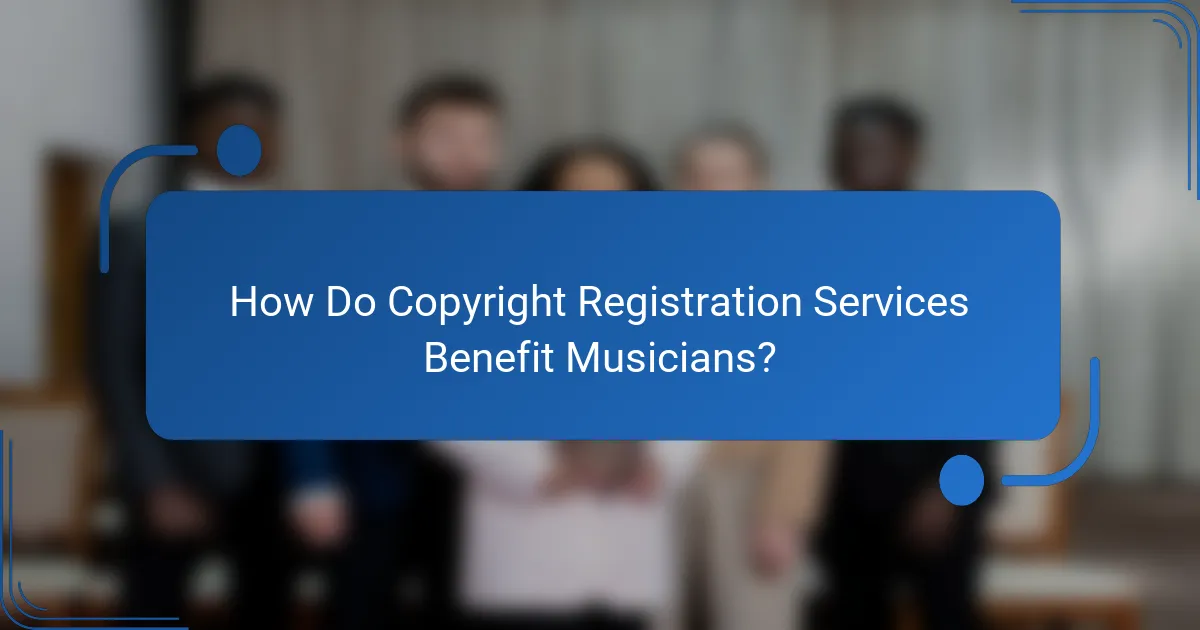
How Do Copyright Registration Services Benefit Musicians?
Copyright registration services provide musicians with essential legal protections, enabling them to safeguard their original works. By registering their music, artists can secure their rights, enhance their revenue potential, and establish clear ownership.
Legal protection for original works
Copyright registration offers musicians legal protection against unauthorized use of their music. This means that if someone uses their work without permission, the musician has the right to take legal action. Registration serves as a public record, making it easier to prove ownership in disputes.
In the U.S., for example, registered works can qualify for statutory damages and attorney fees in infringement cases, which can significantly increase the financial stakes for violators. Musicians should consider registering their works as soon as they are created to ensure they are protected from the outset.
Monetization opportunities
With copyright registration, musicians can explore various monetization avenues, such as licensing their music for films, commercials, or video games. This can lead to additional income streams beyond album sales and live performances.
For instance, a registered song might earn royalties every time it is played on the radio or streamed online. By leveraging copyright protections, musicians can negotiate better deals and maximize their earnings from their creative works.
Proof of ownership
Copyright registration serves as a crucial proof of ownership for musicians, providing a legal document that verifies their rights to a specific piece of music. This can be particularly important when entering contracts or negotiating with record labels and publishers.
Having official documentation can help prevent disputes over ownership and ensure that musicians receive proper credit and compensation for their work. It is advisable for artists to keep records of their registration and any related correspondence to support their claims in case of disputes.
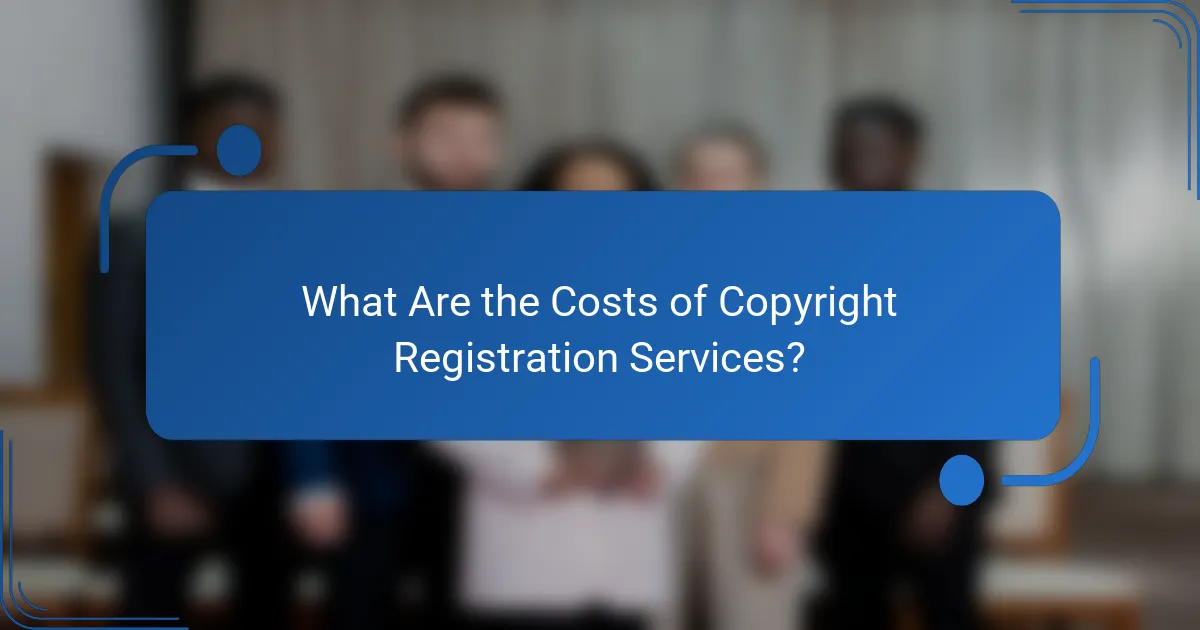
What Are the Costs of Copyright Registration Services?
The costs of copyright registration services can vary significantly based on the provider and the specific services offered. Musicians should consider both initial registration fees and any ongoing costs associated with maintaining copyright protection.
ASCAP fees
ASCAP (American Society of Composers, Authors and Publishers) charges a one-time fee for membership, which typically ranges from around $50 to $150, depending on the type of membership. This fee grants access to performance royalties and various resources for songwriters and composers.
Additionally, ASCAP takes a percentage of the royalties earned, which can be around 10-20%. Musicians should weigh the benefits of membership against these costs to determine if it aligns with their financial goals.
SESAC membership costs
SESAC operates differently from ASCAP, as it is an invitation-only organization. Membership fees are not publicly disclosed, but they are generally considered to be competitive with ASCAP and BMI. SESAC offers personalized services and may charge a percentage of royalties, typically around 10%.
Musicians interested in SESAC should consider the potential for higher royalty rates and personalized support, which may justify the costs involved.
Songtrust pricing
Songtrust offers a straightforward pricing model, charging a one-time setup fee of approximately $100, along with an annual fee of around $100 for ongoing administration. This service helps musicians manage their global publishing rights and collect royalties efficiently.
Songtrust takes a 15% commission on collected royalties, which is competitive compared to traditional publishing deals. Musicians should evaluate the comprehensive services provided against the costs to ensure it meets their needs for copyright management.
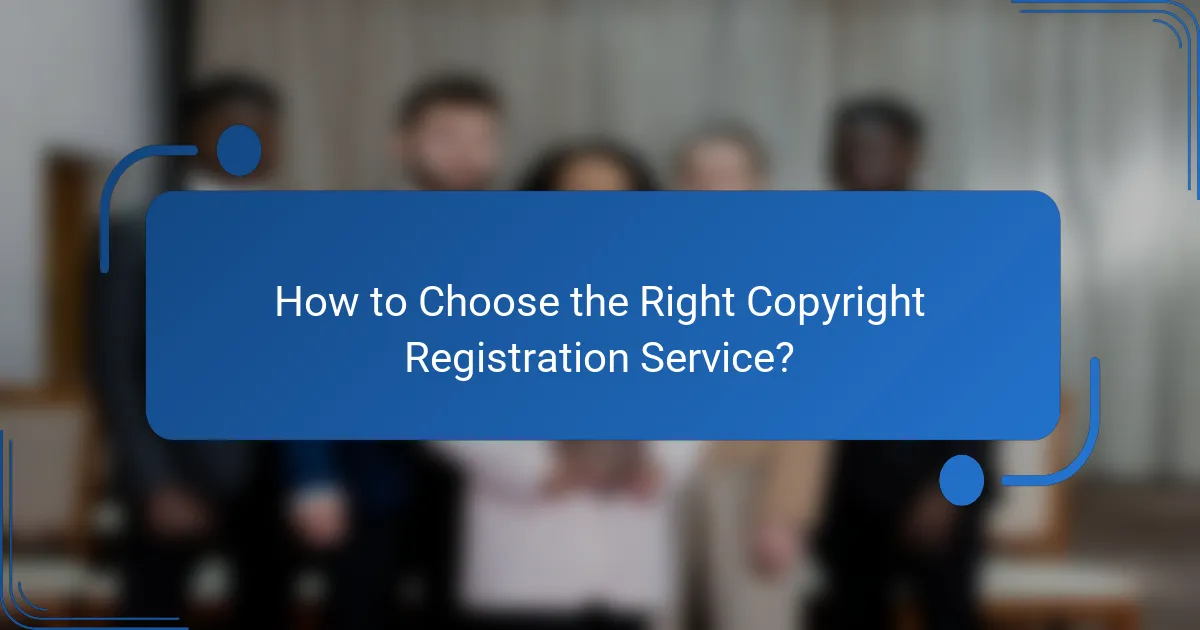
How to Choose the Right Copyright Registration Service?
Choosing the right copyright registration service involves assessing the specific needs of your music, the features offered by different services, and their overall value. Focus on services that provide comprehensive support, clear pricing, and positive user feedback to ensure your creative work is protected effectively.
Consider service offerings
When evaluating copyright registration services, look for those that provide a range of offerings tailored to musicians. Essential features may include online registration, legal assistance, and the ability to track your copyright status. Some services may also offer additional tools like licensing support or educational resources.
For example, a service that includes a user-friendly online portal for submitting your work can save you time and reduce hassle. Additionally, consider whether the service provides ongoing support in case of disputes or infringement issues.
Evaluate pricing structures
Pricing can vary significantly among copyright registration services, so it’s crucial to understand the costs involved. Some services charge a flat fee for registration, while others may have tiered pricing based on the number of works you want to register. Expect to pay anywhere from $35 to $150 for basic registration services.
Be cautious of hidden fees, such as charges for expedited processing or additional services. Always read the fine print and compare what’s included in each package to ensure you’re getting the best value for your investment.
Check user reviews
User reviews can provide valuable insights into the reliability and effectiveness of copyright registration services. Look for feedback on platforms like Trustpilot or Google Reviews to gauge customer satisfaction. Pay attention to comments regarding the ease of the registration process and the quality of customer support.
Additionally, consider reaching out to fellow musicians or industry professionals for recommendations. Personal experiences can help you identify services that are reputable and trustworthy, ultimately guiding you toward a choice that aligns with your needs.
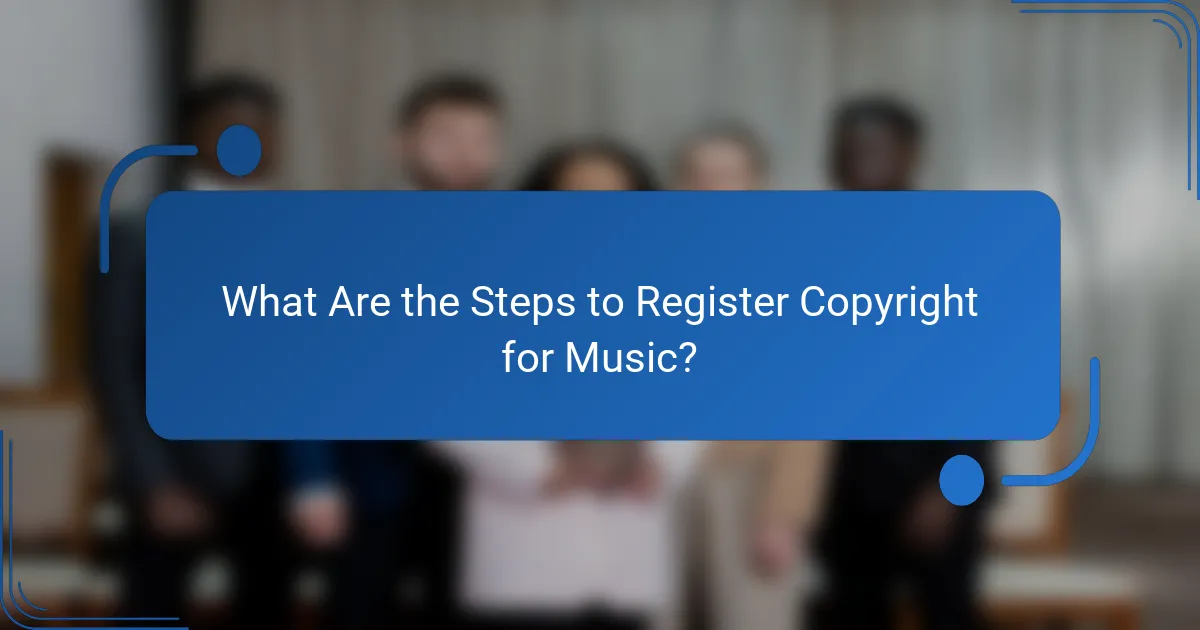
What Are the Steps to Register Copyright for Music?
Registering copyright for music involves a series of steps that ensure your creative work is legally protected. This process typically includes gathering documentation, completing an application, and submitting it to the relevant copyright office.
Gather necessary documentation
To register your music copyright, you’ll need to collect specific documentation that proves your ownership and the originality of your work. This usually includes a copy of the music, lyrics, and any other relevant materials that showcase your creative expression.
Common documents include a recorded version of the song, sheet music, and a signed statement affirming your authorship. If your work is part of a collaboration, you may also need agreements from co-writers or producers to clarify ownership rights.
Ensure that all materials are clear and legible, as incomplete or unclear submissions can delay the registration process. It’s wise to keep copies of everything you submit for your records.
